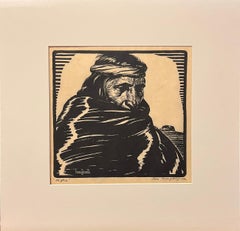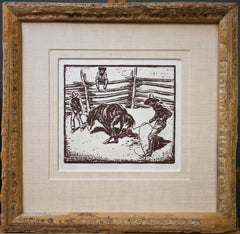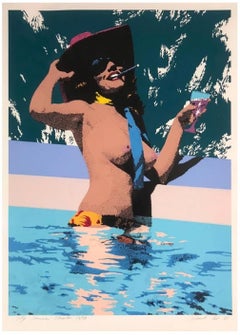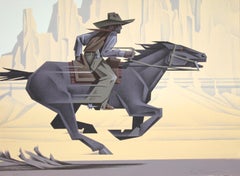Want more images or videos?
Request additional images or videos from the seller
1 of 7
Lon MegargeeThe Cowboy Builds a Loop by Lon Megargee, Portfolio of Sixteen Prints 19441944
1944
$1,500List Price
About the Item
- Creator:Lon Megargee (1883 - 1960, American)
- Creation Year:1944
- Dimensions:Height: 12 in (30.48 cm)Width: 8.75 in (22.23 cm)
- Period:
- Condition:
- Gallery Location:Phoenix, AZ
- Reference Number:1stDibs: LU2623215178662
About the Seller
No Reviews Yet
Vetted Professional Seller
Every seller passes strict standards for authenticity and reliability
1stDibs seller since 2023
8 sales on 1stDibs
Authenticity Guarantee
In the unlikely event there’s an issue with an item’s authenticity, contact us within 1 year for a full refund. DetailsMoney-Back Guarantee
If your item is not as described, is damaged in transit, or does not arrive, contact us within 7 days for a full refund. Details24-Hour Cancellation
You have a 24-hour grace period in which to reconsider your purchase, with no questions asked.Vetted Professional Sellers
Our world-class sellers must adhere to strict standards for service and quality, maintaining the integrity of our listings.Price-Match Guarantee
If you find that a seller listed the same item for a lower price elsewhere, we’ll match it.Trusted Global Delivery
Our best-in-class carrier network provides specialized shipping options worldwide, including custom delivery.You May Also Like
KAWS exhibition poster 2001 (KAWS Tokyo 2001)
By KAWS
Located in NEW YORK, NY
KAWS Tokyo First Exhibit Poster 2001:
2001 KAWS Parco Gallery exhibition poster featuring a photograph by fashion photographer David Sims reimagined by KAWS in his classic 1990's int...
Category
21st Century and Contemporary Street Art Figurative Prints
Materials
Lithograph, Offset
Act III with Portrait /// Contemporary Female Artist Cat Figurative Art Modern
By Dagmar Mezricky
Located in Saint Augustine, FL
Artist: Dagmar Mezricky (Czech, 1944-)
Title: "Act III with Portrait"
*Signed by Mezricky in pencil lower right
Circa: 1988
Medium: Original Lithograph on unbranded heavy white wove ...
Category
1980s Contemporary Figurative Prints
Materials
Lithograph
Blue Wind : Mother & Child - Original handsigned lithograph - 199ex
By Jean-Baptiste Valadie
Located in Paris, IDF
Jean-Baptiste VALADIE
Flowers Blue, White & Red
Original lithograph
Handsigned in pencil
Limited /199 copies
On vellum 56 x 76 cm (c. 22 x 30 in)
Excellent condition
Category
Late 20th Century Modern Figurative Prints
Materials
Lithograph
$295
H 22.05 in W 29.93 in
The Three Graces - Original handsigned lithograph
Located in Paris, IDF
Philippe AUGE (1935-)
The Three Graces
Original lithograph
Handsigned in pencil
Limited /275 copies
On vellum 76 x 55.5 cm (c. 29.92 x 21.65 in)
Excellent condition
Category
Late 20th Century Art Deco Figurative Prints
Materials
Lithograph
The Two Women with Bunches of Flowers - Original Lithograph Signed
By Yves Ganne
Located in Paris, IDF
Yves GANNE (1931-2019)
The Two Women with Bunches of Flowers
Original Lithograph
Signed on pencil
Numbered on 150 copies
On vellum Arches 54 x 76 cm (c. 21.25 x 29.92 in)
Very good...
Category
Late 20th Century Modern Figurative Prints
Materials
Lithograph
$177
H 21.26 in W 29.93 in
Beautiful Woman - Original handsigned lithograph
By Gilles Sacksick
Located in Paris, IDF
Gilles SACKSICK
Beautiful Woman
Original lithograph
Handsigned in pencil
Limited /275 copies
On vellum 76 x 56 cm (c. 29.92 x 22.04 in)
Excellent condition
Category
Late 20th Century Modern Figurative Prints
Materials
Lithograph
The Odalisque - Original handsigned lithograph
Located in Paris, IDF
Philippe AUGE (1935-)
The Odalisque
Original lithograph
Handsigned in pencil
Limited /275 copies
On vellum 63 x 80 cm (c. 24.8 x 31.49 in)
Excellent condition
Category
Late 20th Century Modern Figurative Prints
Materials
Lithograph
Fruit Cup - Original handsigned lithograph
Located in Paris, IDF
Philippe AUGE (1935-)
Fruit Cup
Original lithograph
Handsigned in pencil
Limited /275 copies
On vellum 63 x 79 cm (c. 24.8 x 31.1 in)
Excellent condition
Category
Late 20th Century Modern Figurative Prints
Materials
Lithograph
Doll : Backlighting - Original handsigned lithograph
Located in Paris, IDF
Henri CADIOU
Doll : Backlighting
Original lithograph
Handsigned in pencil
Limited /275 copies
On Arches vellum 65 x 50 cm (c. 25.59 x 19.68 in)
Excellent condition
Category
Late 20th Century Surrealist Figurative Prints
Materials
Lithograph
Tribute to Klimt - Original handsigned lithograph
Located in Paris, IDF
Philippe AUGE (1935-)
Tribute to Klimt
Original lithograph
Handsigned in pencil
Limited /275 copies
On vellum 63 x 79 cm (c. 24.8 x 31.1 in)
Excellent condition
Category
Late 20th Century Art Deco Figurative Prints
Materials
Lithograph
More From This Seller
View AllHopi by Lon Megargee, Original Signed Block Print ca. 1920s
Located in Phoenix, AZ
Title: Hopi ca. 1920s
Artist: Lon Megargee
Medium: Block Print
Size: 11 x 11 inches (Sight Measurement)
SHIPPING CHARGES INCLUDE SHIPPING, PACKAGING & INSURANCE
Creator of Stetson's hat logo "Last Drop from his Hat"
Image of Lon Megargee not included in purchase.
Lon Megargee
1883 - 1960
At age 13, Lon Megargee came to Phoenix in 1896 following the death of his father in Philadelphia. For several years he resided with relatives while working at an uncle’s dairy farm and at odd jobs. He returned to Philadelphia in 1898 – 1899 in order to attend drawing classes at the Pennsylvania Academy of the Fine Arts. Back in Phoenix in 1899, he decided at the age of 16 to try to make his living as a cowboy.
Lon moved to the cow country of Wickenburg, Arizona where he was hired by Tex Singleton’s Bull Ranch. He later joined the Three Bar R. . . and after a few years, was offered a job by Billy Cook of the T.T. Ranch near New River. By 1906, Megargee had learned his trade well enough to be made foreman of Cook’s outfit.
Never shy about taking risks, Lon soon left Cook to try his own hand at ranching. He partnered with a cowpuncher buddy, Tom Cavness, to start the El Rancho Cinco Uno at New River. Unfortunately, the young partners could not foresee a three-year drought that would parch Arizona, costing them their stock and then their hard-earned ranch.
Breaking with his romantic vision of cowboy life, Megargee finally turned to art full time. He again enrolled at the Pennsylvania Academy of Art and then the Los Angeles School of Art and Design during 1909 – 1910. The now well-trained student took his first trip to paint “en plein air” (outdoors) to the land of Hopi and Navajo peoples in northern Arizona. After entering paintings from this trip in the annual Territorial Fair at Phoenix, in 1911, he surprisingly sold his first oil painting to a major enterprise – the Santa Fe Railroad . . . Lon received $50 for “Navajos Watching the Santa Fe Train.” He soon sold the SFRR ten paintings over the next two years. For forty years the railroad was his most important client, purchasing its last painting from him in 1953.
In a major stroke of good fortune during his early plein-air period, Megargee had the opportunity to paint with premier artist, William R. Leigh (1866 – 1955). Leigh furnished needed tutoring and counseling, and his bright, impressionistic palette served to enhance the junior artist’s sense of color and paint application. In a remarkable display of unabashed confidence and personable salesmanship, Lon Megargee, at age 30, forever linked his name with Arizona art history. Despite the possibility of competition from better known and more senior artists, he persuaded Governor George Hunt and the Legislature in 1913 to approve 15 large, historic and iconic murals for the State Capitol Building in Phoenix. After completing the murals in 1914, he was paid the then princely sum of roughly $4000. His Arizona statehood commission would launch Lon to considerable prominence at a very early point in his art career.
Following a few years of art schooling in Los Angeles, and several stints as an art director with movie studios, including Paramount, Megargee turned in part to cover illustrations for popular Western story magazines in the 1920s.
In the 1920s, as well, Lon began making black and white prints of Western types and of genre scenes from woodblocks. These prints he generally signed and sold singly. In 1933, he published a limited edition, signed and hard-cover book (about 250 copies and today rare)containing a group of 28 woodblock images. Titled “The Cowboy Builds a Loop,” the prints are noteworthy for strong design, excellent draftsmanship, humanistic and narrative content, and quality. Subjects include Southwest Indians and cowboys, Hispanic men and women, cattle, horses, burros, pioneers, trappers, sheepherders, horse traders, squaw men and ranch polo players. Megargee had a very advanced design sense for simplicity and boldness which he demonstrated in how he used line and form. His strengths included outstanding gestural (action) art and strong figurative work. He was superb in design, originality and drawing, as a study of his prints in the Hays collection reveals.
In 1944, he published a second group of Western prints under the same title as the first. Reduced to 16 images from the original 28 subjects, and slightly smaller, Lon produced these prints in brown ink on a heavy, cream-colored stock. He designed a sturdy cardboard folio to hold each set. For the remainder of his life, Lon had success selling these portfolios to museum stores, art fairs and shows, and to the few galleries then selling Western art.
Drawing on real working and life experiences, Lon Megargee had a comprehensive knowledge, understanding and sensitivity for Southwestern subject matter. Noted American modernist, Lew Davis...
Category
1920s American Impressionist Figurative Prints
Materials
Woodcut
Bronc by Lon Megargee, Woodblock Print ca. 1920s with Handmade Saguaro Rib Frame
Located in Phoenix, AZ
SHIPPING CHARGES INCLUDE SHIPPING, PACKAGING & **INSURANCE**
Bronc by Lon Megargee, Woodblock Print ca. 1920s
Handmade Saguaro Rib Frame, double linen mat, museum archival materials
Bronc
Woodblock Print, signed in print
Image: 8 3/4 x 9 7/8 inches
Frame: 21 x 20 inches
SHIPPING CHARGES INCLUDES, SHIPPING, PACKAGING & INSURANCE
FINE ART ESTATE OF LON MEGARGEE
Megargee Custom Handmade Saguaro Frame
We offer signed in print and original signature block prints. Custom, hand carved, signature frames, with archival standards and a speciality in hand dyed mats and french matting are provided for a beautiful and timeless presentation.
Free shipping Continental US
Biography
Megargee explored different mediums; printmaking captivated him in particular. The contrast of the black and white block print method captured perfectly his interpretation of a bold American West. The first print was produced around 1921 and culminated with the creation of “The Cowboy Builds a Loop” in 1933 with 28 images and poetry by his friend, Roy George. Megargee continued producing prints throughout the 1940s and early 50s.
Creator of the iconic logo for the Stetson Hat Company, " Last Drop From his Stetson", still in use today.
Fine Art Estate of Lon Megargee
At age 13, Lon Megargee came to Phoenix in 1896 following the death of his father in Philadelphia. For several years he resided with relatives while working at an uncle’s dairy farm and at odd jobs. He returned to Philadelphia in 1898 – 1899 in order to attend drawing classes at the Pennsylvania Academy of the Fine Arts. Back in Phoenix in 1899, he decided at the age of 16 to try to make his living as a cowboy. Lon moved to the cow country of Wickenburg where he was hired by Tex Singleton’s Bull Ranch. He later joined the Three Bar Ranch . . . and, after a few years, was offered a job by Billy Cook...
Category
Early 20th Century Figurative Prints
Materials
Woodcut
My Summer Vacation by Bill Schenck
By Bill Schenck
Located in Phoenix, AZ
SHIPPING CHARGES INCLUDE SHIPPING, PACKAGING & **INSURANCE**
My Summer Vacation
Serigraph 1984
33 × 24 in
83.8 × 61 cm
Edition of 59
VERY RARE
UNFRAMED
SHIPPING CHARGES INCLUDE S...
Category
1980s Contemporary Figurative Prints
Materials
Screen
Full Speed Ahead by Ed Mell
By Ed Mell
Located in Phoenix, AZ
Full Speed Ahead 1985
Ed Mell 1942-2024
Original signature lower right
Stone Lithograph
22 x 30 inches
MINT CONDITION. NEVER FRAMED!
SHIPPING CHARGES INCLUDE SHIPPING, PACKAGING...
Category
1980s Figurative Prints
Materials
Lithograph
Fiesta by Luis Jimenez (Diptych) Stone Lithograph
By Luis Jiménez
Located in Phoenix, AZ
Artist: Luis Jimenez, American (1940 - 2006)
Title: Fiesta (Diptych)
Year: 1986
Medium: Two Lithographs on Arches, signed and numbered in pencil
Edition: 76
Size: 34 x 24 in. (86.36 ...
Category
1980s Contemporary Figurative Prints
Materials
Lithograph
Down to the Valley by Bill Schenck
By Bill Schenck
Located in Phoenix, AZ
Down in the Valley
Bill Schenck
Serigraph 46/50
Edition of 50
Image size: 25 x 29 inches
Paper size: 31 x 35 inches
SHIPPING CHARGES INCLUDE SHIPPING, PACKAGING & INSURANCE
UNFRAM...
Category
1990s Contemporary Figurative Prints
Materials
Screen
Recently Viewed
View AllMore Ways To Browse
Vintage Stetson
Stetson Hat Vintage
Lithograph Picasso 1957
Make Art Not War
Marc Chagall Poster Framed
Marc Chagall The Lovers
Marino Marini Shakespeare
Mary Cassatt Etchings
Matisse Signed Print
Max Baer
Max Beckmann Drypoint
May Belfort
Melanie Taylor Kent
Mexican Revolution Art
Michel Delacroix On Sale
Munch Poster 1969
Naoko Matsubara
Nude At The Window Dali



